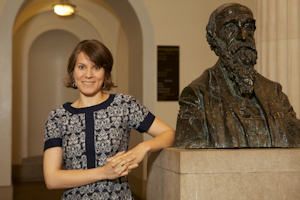Putting a good word in for Manchester
04 Dec 2014
How our Learning Through Research programme enhances our students' learning experience and improves their employability

Manchester’s linguistics students have captured the nation’s imagination – by using YouTube and the Beckhams to answer dynamic new questions about Britain’s dialects.
In studies that could never have been done 10 years ago, they have been exploring how the way people speak changes over the course of a lifetime.
They analyse pre-recordings of public figures - celebrities or politicians - to pinpoint a range of subtle differences.
And their findings on football icon David Beckham and his fashion designer wife Victoria means their ground-breaking work has already featured in a raft of national newspapers.
The course is part of the Learning Through Research programme, which sees undergraduate students taught about their subject by looking at – or even doing – research. This not only enhances our students’ learning experience, it will improve their employability by increasing the scope of their studies and skills base.
“This is a new and really dynamic research question in linguistics - whether people can change the way they talk across their lifetime, and if so how and why,” says English Linguistics lecturer Dr Laurel Mackenzie.
“People have always speculated but it’s been difficult to scientifically evaluate without the right sort of data.
“YouTube has been a godsend, a positive treasure trove of information. With two recordings of someone at different points in time you can go wild.
“It has suddenly become much easier to get the kind of data we need, to find it online and to store it.”
The research into the Beckhams was particularly fascinating, comparing David’s latest recorded interviews with his first as a 16-year-old cockney kid thrust into the spotlight and listening to Essex girl Victoria as a Spice Girl and again as a successful designer.
“We looked at how at the beginning David dropped his Hs and she ‘swallowed’ her Ls,” said Dr Mackenzie.
“We did a proper scientific quantitative study, counting how many times they did it before they moved to the US and how many after. The rate goes down.
“We don’t know why; whether it was sub-conscious, whether they want to sound posher or more American. You can’t tease those apart in this case. But it stands up to rigorous scientific scrutiny.”
It isn’t the first time her students’ work has made it into the pages of the press.
Their quantitative research into the UK’s linguistic features also hit the headlines after students looked at people’s choice of words for items like bread rolls and trainers.
And by mapping their study into certain word pronunciations they found that the line between north and south variations has moved further north over the past 50 years- but still very much exists.
“They really got their hands dirty doing all this work,” says Dr Mackenzie. “It’s unusual for undergraduates to be able to contribute so much, especially in terms of quantitative studies but it shows them how research works and how difficult it can sometimes be.”
She says she is delighted by the high profile response - but not nearly as excited as the students themselves.
“They are thrilled,” she says. “I’ve seen them include it in personal statement applications for Masters programmes and jobs and put it on their CVs. It’s a nice reminder that what we do as academics is relevant to the greater public
“It proves we’re not just stuck in an ivory tower poring over a book. We’re actually telling people about the world around them.”
Graduate Naomi Proszynska, who worked on the Beckham project, said it had taught her skills that she would now use in her working life. “Dr Mackenzie gave us the tools required, but after that she left us to research and write our reports independently. That’s something that has importance out in the real world.”
